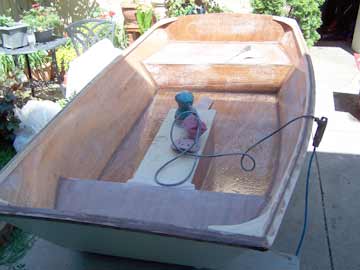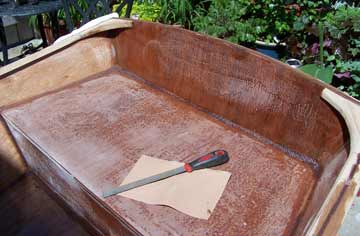
DAY 13
Building a Tender for my Keelboat

DAY 13 of building the Apple Pie Dinghy
Nick is back and he helped me turn the boat over. He was amused that I had snuck in a boat building project while he was gone. I took a good look. The interior is quite rough. I had trouble fitting the fibreglass on because the resin was setting faster than expected and I had to take some short cuts. No real problem though. So I started sanding. What else.
I'm using a Makita BO5030 5-Inch Random Orbit Sander
and I have had really good service from it. (Amazon.com link) Eventually after 15 years it died. That's a pretty good run for a tool that get's that much use.
When it started failing I opened it up to see, if you're interested in what's inside a sander the link is here.

A close up of the back edge shows the outside gunwale. It's pretty typical. since I attached the gunwales with the boat up side down, it was hard to control the process. It was convenient to do it that way and saved time. The edges either have squeezed out epoxy, or the wall is slightly lower than the gunwales creating a small dip. Both these things will come out after either sanding/grinding, or some slight filling. I could also grind the hollow out but I would rather not thin my gunwales beyond the three quarter inch width.

Gunwales and knees have been sanded and any hollow filled with thickened epoxy.
I've been dodging squalls all afternoon. There is a strong wind advisory and a squall warning. Rain comes and goes in a couple of minutes and I have to scramble to cover the boat.
The edges of the seats also get rounded. I considered using a router but the sander is just as fast.

While the fill on the gunwales is setting, the knees get some shaping. They had been fitted to the boat but not shaped. This happens now. The edges get rounded and the edge that connects to the inwale gets sanded to the same thickness. Most interior joints did not have finished fillets so these went on. I tried to make them as smooth as I could since that translates into a lot less sanding. Flat surfaces get some sanding and any drip or big bump gets ground down. There is another coat of epoxy yet to be applied so it is a waste of time to sand too much.

Pilot holes were drilled where the mast and daggerboard will be opened.

Using a router with a pilot bearing, the dagger board slot and mast opening are made. It's a pleasure to do this so quickly and cleanly. I had mis-measured where the mast would go and as a result it's one quarter inch to port. Annoying.
I went online to the Wooden boat forum to find out about no slip coating for the bottom of the boat. Got a few suggestions. I did not want to buy yet another product.
The dagger board got another coat of paint, it still needs another.
Went looking for pintles and gudgeon and ended up buying online from Duckworks. They supplied the link to the free plans so I figured they might as well get the business. I went to local chandlers but they did not have any except for very expensive racing ones for optimists.
The resin on the gunwales had set so I did some sanding.
Could not resist putting the mast up. It's a bit loose but I can put a wedge and this will work fine. The mast I made is smaller than I had planned and besides it's not a bad thing to be able to use a larger mast if I want to experiment. Gave the mast and spars a quick sand, in particular in the holes that were drilled.
Yet another rain shower so I covered the boat. Tomorrow I should be able to sand the filling, finish shaping the knees and gunwales, and apply a final coat of epoxy to the inside.
In this project I applied epoxy using mostly a paintbrush. I also experimented using a spreader made from a piece of plastic. This made a much smoother finish. I think in the future I will apply epoxy to cloth only using a spreader when I can.
Today I have worked about 6 hours on the boat. This brings the total to 94 hours.
email: Christine
This web site reflects my personal ideas and doesn't represent anyone else's point of view. I'm not an expert boat builder and don't suggest that how I'm doing this is the best way, use your head.
I'M BUILDING A SCAMP SAILBOAT
PAGE WITH BOATBUILDING BOOKS
BOAT PLANS FREE STITCH AND GLUE BOAT PLANS
Bateau has Boatbuilding plans suitable for beginners, including some free plans, as well as boatbuilding supplies such as epoxy and fiberglass
BOATBUILDING TOOLS, YOU ONLY NEED A FEW TOOLS TO BUILD A BOAT
Boatbuilding books
Buehler's Backyard Boatbuilding

Featherweight Boatbuilding, has plans and instruction to build a Wee lassie canoe

HOW TO DECIDE WHAT KIND OF BOAT TO BUILD
MY BOATS
MAKING A CARBON FIBER MAST
TEN KNOTS YOU SHOULD KNOW IF YOU HAVE A BOAT
ROPE INFORMATION, POLYESTER
BUILDING MY SKERRY
STITCH AND GLUE BOATBUILDING
TANZER 22 MAIN PAGE
MARINE PLYWOOD STANDARDS
BOAT PLANS FREE STITCH AND GLUE BOAT PLANS
FIND OUT ABOUT DIFFERENT TYPES OF ANCHORS
BUILDING A PUDDLE DUCK RACER